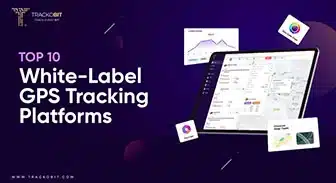-
TrackoBit
Manage commercial vehicles with the new-age Fleet Management Software
TrackoBit -
TrackoField
Streamline your scattered workforce with Field Force Management Software
TrackoField -
Features Resources
-
Blog
Carefully curated articles to update you on industrial trends. -
White Paper
Insightful papers and analysis on essential subject matters. -
Glossary
Explore an alphabetical list of relevant industry terms. -
What’s New
Get TrackoBit & TrackoField monthly updates here. -
Case Study
Explore the cases we solved with our diverse solutions. -
Comparisons
Compare platforms, features, and pricing to find your best fit.
-
About Us
Get to know TrackoBit: our team, ethos, values, and vision. -
Careers
Join the most dynamic cult of coders, creatives and changemakers. -
Tech Support
Learn about our technical support team and services in detail. -
Events
Check out the exhibitions where we left our marks and conquered. -
Contact Us
Connect with us and let us know how we can be of service.
5 Ways to Manage Fuel Consumption for Fleet Businesses
- Author:Drishti Dua
- Read Time:8 min
- Published:
- Last Update: May 12, 2025
Table of Contents
Toggle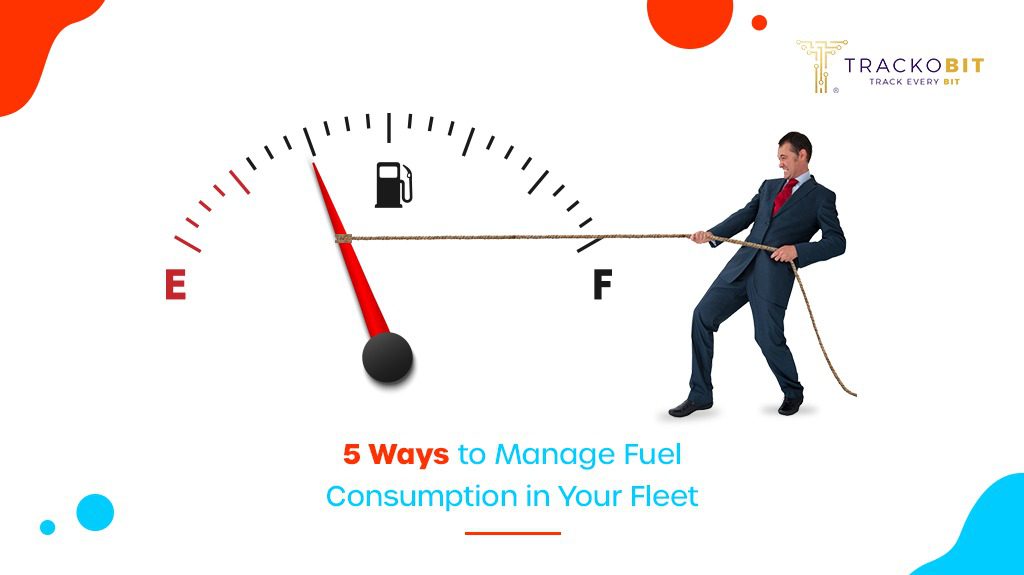
A Fleet management system can help fleet businesses manage their fuel cost. It aids decision-making by presenting actionable insights.
Table of Contents
Toggle
Running a fleet can be a mix of several fixed and many variable costs. These things coming together is what forms a fleet’s budget. But with the constantly shooting fuel prices, inflation, and price rise, this budget is difficult to predict, putting businesses in a pickle. This means that they can do nothing but adapt to the new fuel prices forced on them, cutting down the cost of other aspects of fleet operations.
But this cannot be their only option, right?
Of course not! Investing in a fleet management system to reduce the fleet’s fuel consumption is a good way to stabilise expenditure. But how can that be executed? Here is a complete guide on everything you need to know about ways to cut down fuel expenditure.
Why Should You Monitor Fuel Consumption?
Fuel can be a very precious commodity for most fleets. But why do you think this is the case? Well imagine this, you start eating a kind of food you know is limited. Naturally, you will be forced to limit your consumption to make the food last longer. Similar is the case with fuel as well.
The primary energy sources for fleets all over the world are fossil fuels. Being limited in quantity means that these fuels are considered precious which is why governments are taking necessary measures to reduce their consumption. Before we look into ways that can help fleet businesses reduce their fuel consumption, let us look at some reasons why it is a necessary step:
Rising Prices
Fuel prices are ever-rising. While for a vehicle or two, it might not seem like a huge issue, imagine having to pay extra money for a fleet of a hundred vehicles. While we are slowly working towards other modes of energy, the complete switch is still a far-fetched dream. This is why reducing fuel consumption is the only way for businesses to cut down their fuel costs.
High Expenditure
As we mentioned above, with a hike in fuel prices, fleets lose a significant chunk of their budget to fuel purchasing. Not making correct decisions related to where a vehicle should get its fuel refilled also impacts its expenditure. Some states have higher fuel prices while others are cheaper. Even switching to greener fuels is costly as fleet businesses will have to buy new vehicles. This is also an extra expenditure.
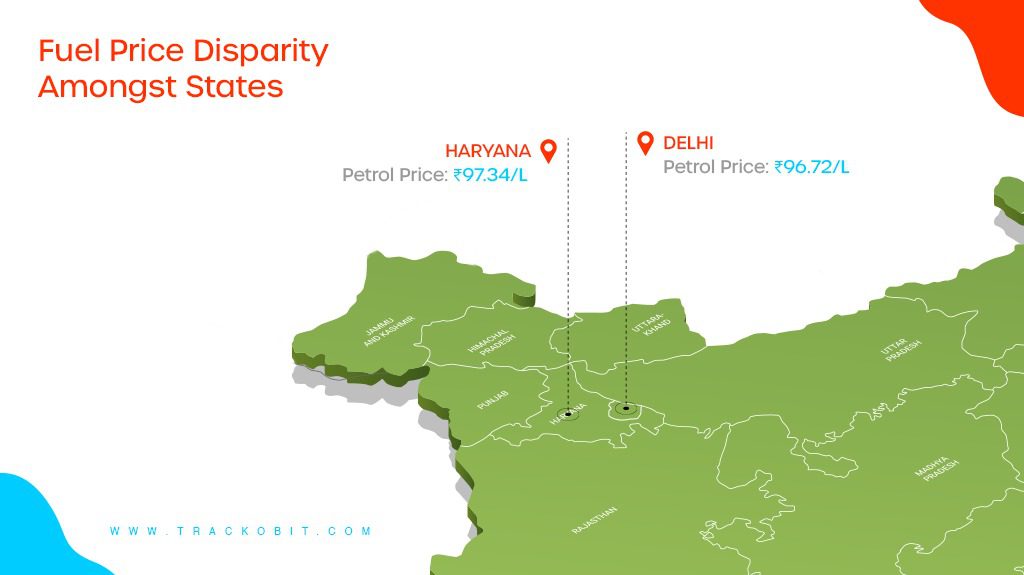
Carbon Footprints
One side effect of burning fossil fuels is the residue it leaves behind. These toxic pollutants mingle with the air and become a hazard to people’s health. There is a chance your fleet might be a huge contributor to the ongoing climate change. Heavy fines surrounding pollution of air can be another reason why fleet businesses should monitor their fuel consumption.
Why Do Fleet Businesses Have Excess Fuel Wastage?
A vehicle fleet can be very costly to maintain. Well, it is kind of inevitable, isn’t it? Fuel prices are on the rise and for fleets that run solely on these fuels, there is no option but to spend more. But are the rising fuel prices because of this hike price only? Or are the fleet’s operations at fault too?
Let us look at a couple of ways in which the fleet loses money on fuel:
Low Vehicle Maintenance
Not maintaining good vehicle health can lead to high fuel consumption. Why is this the case? Well, to begin with, there are two types of maintenance that a vehicle can undergo. One is preventive maintenance and the other is corrective maintenance. While preventive maintenance detects any issue with the vehicle at an early stage, corrective maintenance helps repair the vehicle post-damage.
Ignoring all forms of servicing procedures a vehicle might need can be very risky. A damaged or badly maintained engine can cause the vehicle to consume more fuel than necessary. It might also not burn fuel properly, leading to higher residue than normal.
Read Blog – Effects of Bad Vehicle Maintenance
Unethical Driving
Drivers are responsible for how a vehicle is driven. But does their driving have anything to do with a fleet’s fuel consumption? What if I told you that the way you drive a vehicle is directly related to the amount of fuel it consumes? For example, an overspeeding vehicle consumes almost 7-10% more fuel than normal.
Engine Idling is another issue that fleet businesses have to tackle. An idling vehicle can consume almost half a gallon of fuel without any displacement. Isn’t this a huge waste?
Pilferage
When drivers are left unattended, it is a huge window for them to execute acts of pilferage. Pilferage can be in the form of both manipulating fuel purchase records and stealing the fuel directly. As the fuel is very expensive, drivers might resell it in the market. Some common methods of fuel pilferage are:
- Changing Odometer Readings: Drivers might somehow increase their odometer readings. This means that if a vehicle has travelled more, its fuel consumption will also be high. During reimbursement, drivers will thus be paid more.
- Direct Theft: Drivers might take out fuel from the tank directly. Thus, fleet managers will never realise that a vehicle’s high fuel consumption is not due to its performance.
- Manipulating Invoices: Faking the money spent on fuel purchases is a popular way of fooling fleet businesses into spending more.
5 Ways to Reduce Fuel Consumption With Fleet Management System
Hopefully, we have understood the underlying problems in fleet management that lead to a fleet losing money on fuel. So how can a business ensure that it does not fall prey to such issues? The best way to do that is by investing in a fleet management system. Let us take a deeper dive into the software’s features that can be of help.
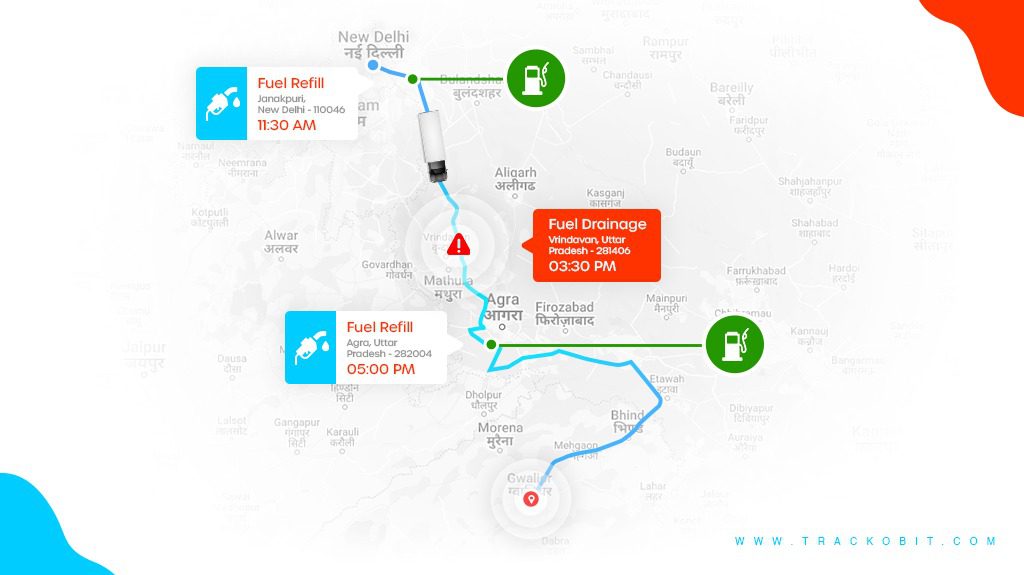
Fuel Monitoring Solution
First and foremost there are fuel monitoring solutions that can aid businesses to cut down fuel consumption. Here’s how!
- Drainage/Refill Alerts: Every time a vehicle’s fuel tank experiences a sudden rise in fuel levels, it sends out an alert to managers. This means that the driver has purchased fuel. Similarly, the same procedure is followed for a sudden decrease in fuel levels as well. On getting the alerts, managers can investigate the situation. If the loss is due to some leakage, it can be fixed and if it is due to pilferage, necessary action can be taken.
- Real-time Fuel Tracking: Fleet managers have access to their vehicles’ fuel levels in real-time. Thus, they know when a tank is running empty and might require a refill. Any attempts of pilferage are thus eliminated.
- Diverse Reports: The solution has a wide array of reports for fleet businesses. These reports include mileage reports, drainage reports, and so on. By studying these insights, managers can take necessary actions to ensure that the fleet improves its fuel consumption habits.
- State Fuel Price: The system allows managers to see each state’s live fuel price. Where the vehicle buys fuel can also heavily impact its total fuel expenditure. Thus, managers need to optimise their routes in a way that they purchase cheaper fuel as compared to other places.
Route Planning Solution
Now that we have understood how fuel management systems help fleet businesses monitor their fuel expenditure, the next step is to optimise this expenditure itself. The kind of routes a vehicle adopts while executing a task also impacts fuel consumption. But how can fleet managers know where their drivers drive?
Route planning solution has all the right tools for this! Simply entering the halts required and their sequence allows managers to select the best-suited route for their fleet. They can select roads that are in good condition and with less traffic for tasks. Thus, fuel loss due to such external issues can be cut down.
But what if the driver does not adhere to the route you have fixed for him? Taking longer routes leads to fuel wastage. Well do not worry, we have you covered. The system alerts managers every time their driver strays off the decided route. Thus, managers can enquire about the reason for this route deviation.
Driver Behaviour Solutions
We have already discussed how driving practices impact the fuel consumption of a vehicle. So why not eliminate this issue immediately and reduce bad driving habits? This is exactly the function of driver behaviour monitoring solutions.
The system works on alerts that managers receive every time the software detects a driver doing any one of these practices:
- Abrupt braking
- Over speeding
- Sudden acceleration
- Harsh cornering
- Idling
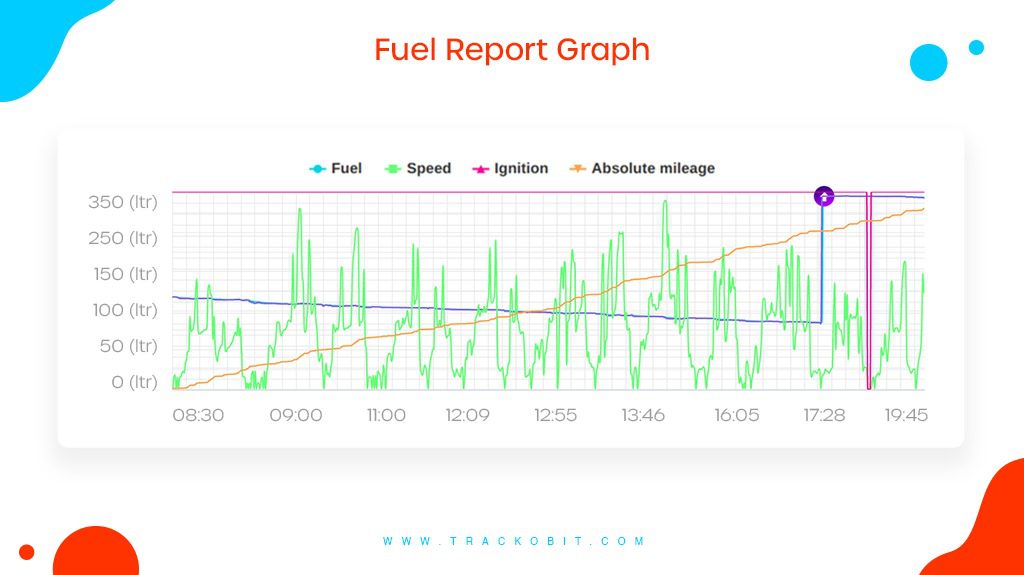
Driver Training
Consciousness towards fuel consumption is not something drivers gain naturally. This is why managers need to devise proper training programs for their drivers. This will help them detect their daily habits that might be harming the business in the long run. Fleet businesses that use reports to understand their fleet’s performance can easily understand which one of their drivers needs training and which ones are doing well.
Good driving practices come with a lot of benefits. While fuel management is high up there, it promotes vehicle and driver safety. This leads to fewer accidents and diminished operation costs for the fleet business.
Vehicle Diagnostics
Keeping a vehicle healthy is one of the main steps in achieving optimum fuel consumption for a fleet business. But getting each and every vehicle checked daily is nearly impossible. So how can managers ensure that their vehicles are in good condition before a trip?
By integrating a vehicle’s OBD with the fleet management system, managers can see their information in real time. This data might include the tyre pressure, engine health and other things like airbags and seatbelts.
This added safety can ensure that managers act on any abnormalities before theory converts into a hazard or fatality. Thus, a vehicle running in good condition will help reduce the business’ overall fuel consumption as well.
Want to Monitor Your Fuel Consumption?
We now know that investing in fleet management software is the best way for you to monitor your fleet’s fuel consumption. But which system to trust out of all the options available for your business? Don’t worry, we have the best match for you!
Meet TrackoBit, the leading fleet management system in the market. Its fuel management solution is one of the best in the industry. But this software goes beyond that. Its solutions like driver behaviour monitoring, route planning, video telematics and asset tracking make optimisation of the fleet very easy.
Watch the software do what it does best, make business profitable.
Drishti Dua, a Content Contributor at TrackoBit has a rich background in literature and professional expertise in SaaS and technology writing. She has carved her niche in the space of Geospatial techn... Read More
Related Blogs
-
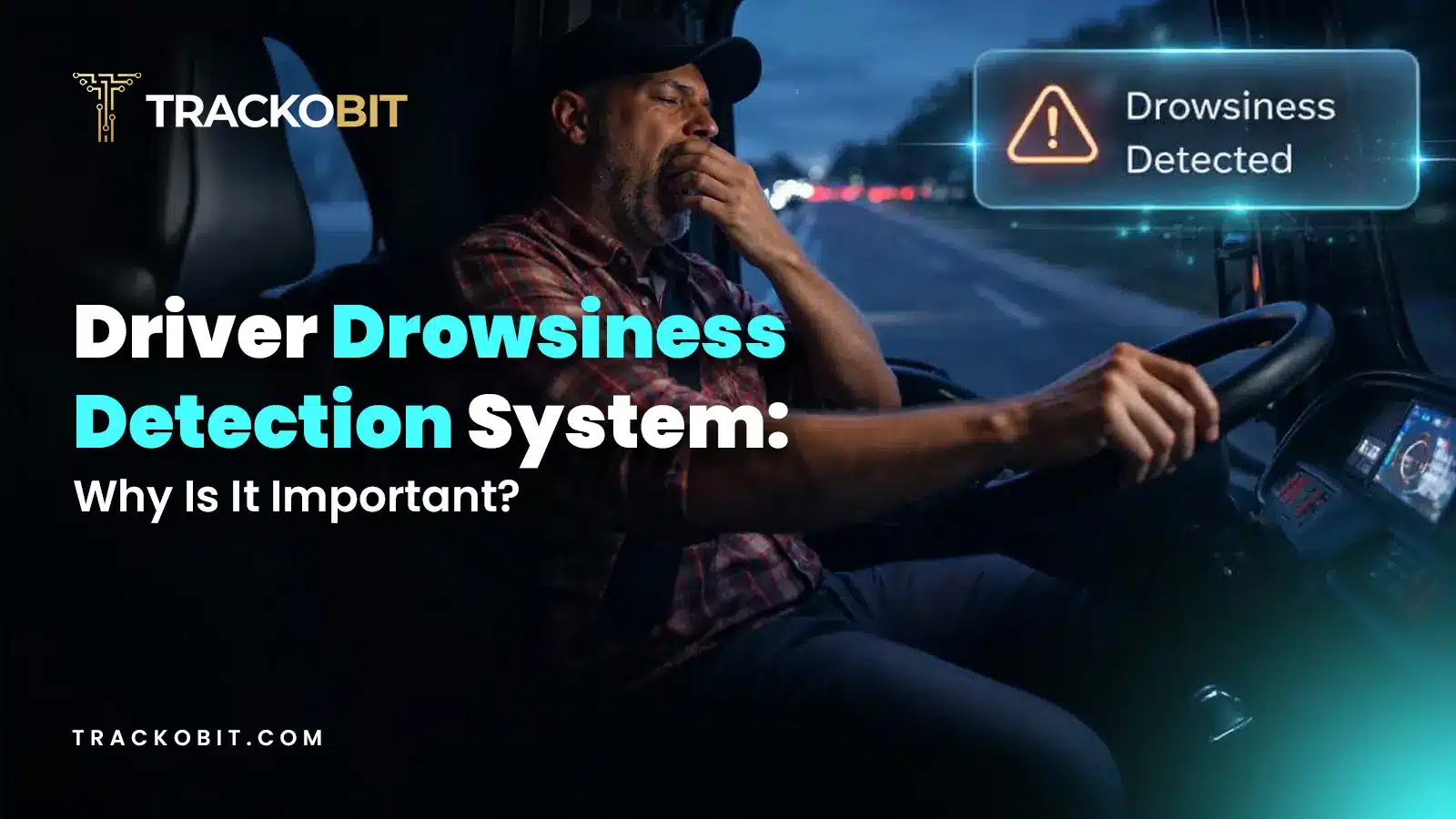
Why is Driver Drowsiness Detection System Important for Fleet Management?
Shemanti Ghosh February 4, 2026A driver drowsiness detection system is critical for fleet management. It helps prevent fatigue-related accidents and reduces operational risks through…
-
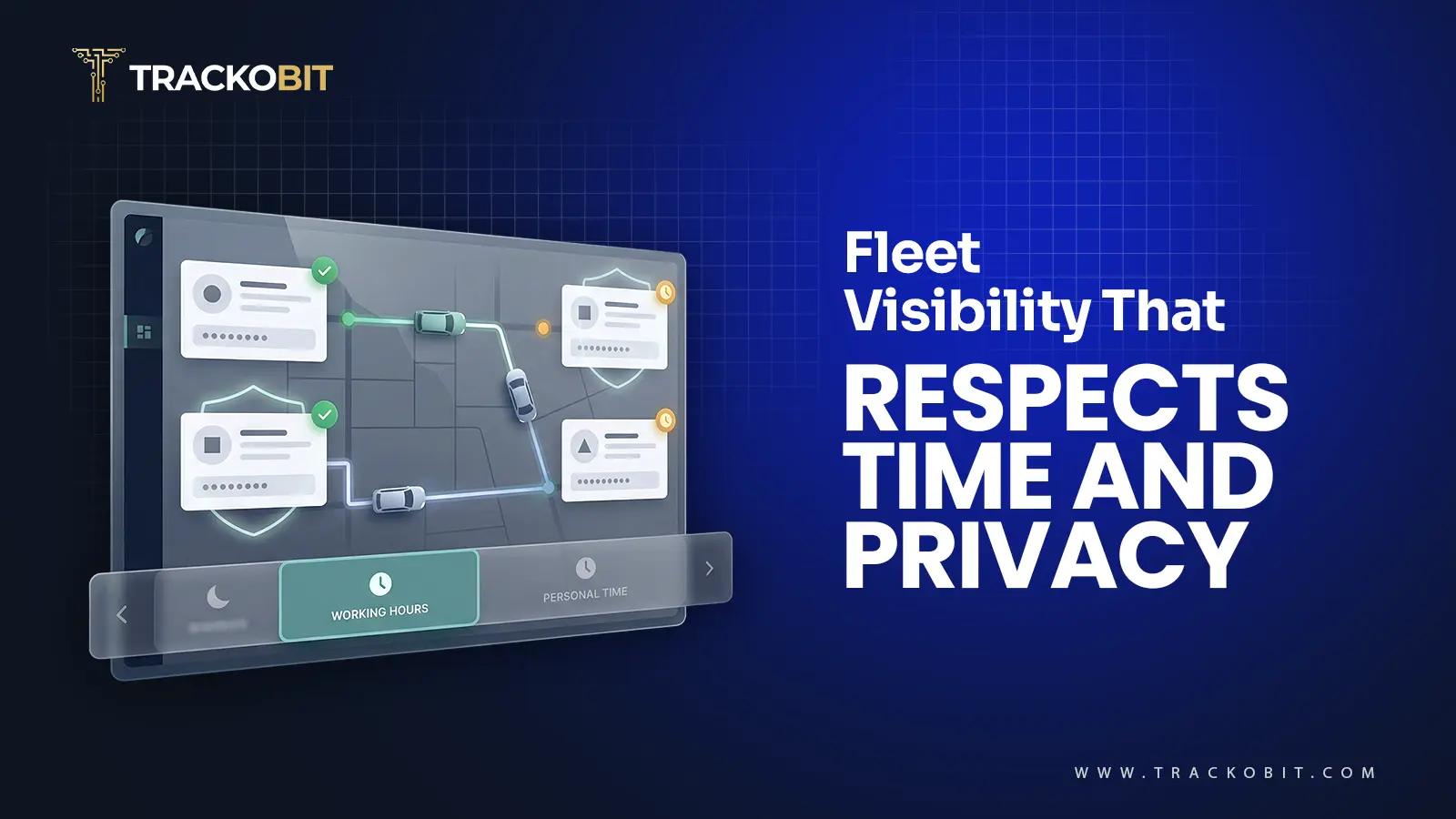
When Tracking Needs a Clock: Rethinking Fleet Visibility
Tithi Agarwal December 24, 2025Read on to understand why fleet tracking works better when it follows working hours. Because visibility should support operations, not…
-

What Makes TrackoBit’s Video Telematics Software Truly Next-Gen?
Shemanti Ghosh December 17, 2025TrackoBit’s video telematics software blends smart video intelligence with full server control. The result? Superior fleet reliability and safety.
-
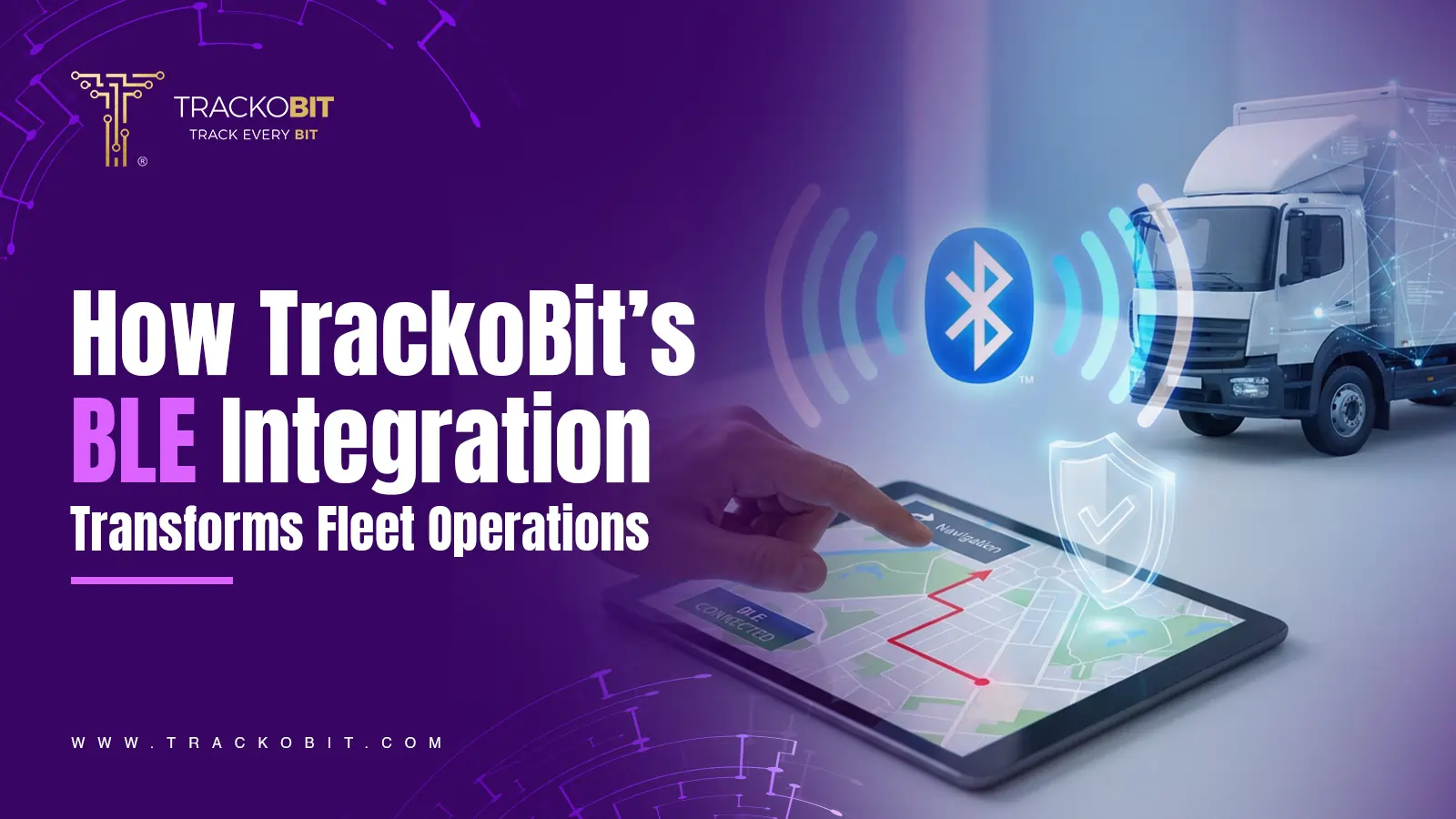
Plug, Pair, Perform TrackoBit Introduces BLE Sensor Integration
Tithi Agarwal November 26, 2025TrackoBit’s BLE Sensor Integration enables wireless, real-time monitoring with faster installs and accurate insights. It improves fleet efficiency, visibility, and…

Subscribe for weekly tips to optimize your fleet’s potential!
Your inbox awaits a welcome email. Stay tuned for the latest blog updates & expert insights.
"While you're here, dive into some more reads or grab quick bites from our social platforms!"Stay Updated on tech, telematics and mobility. Don't miss out on the latest in the industry.
We use cookies to enhance and personalize your browsing experience. By continuing to use our website, you agree to our Privacy Policy.



































